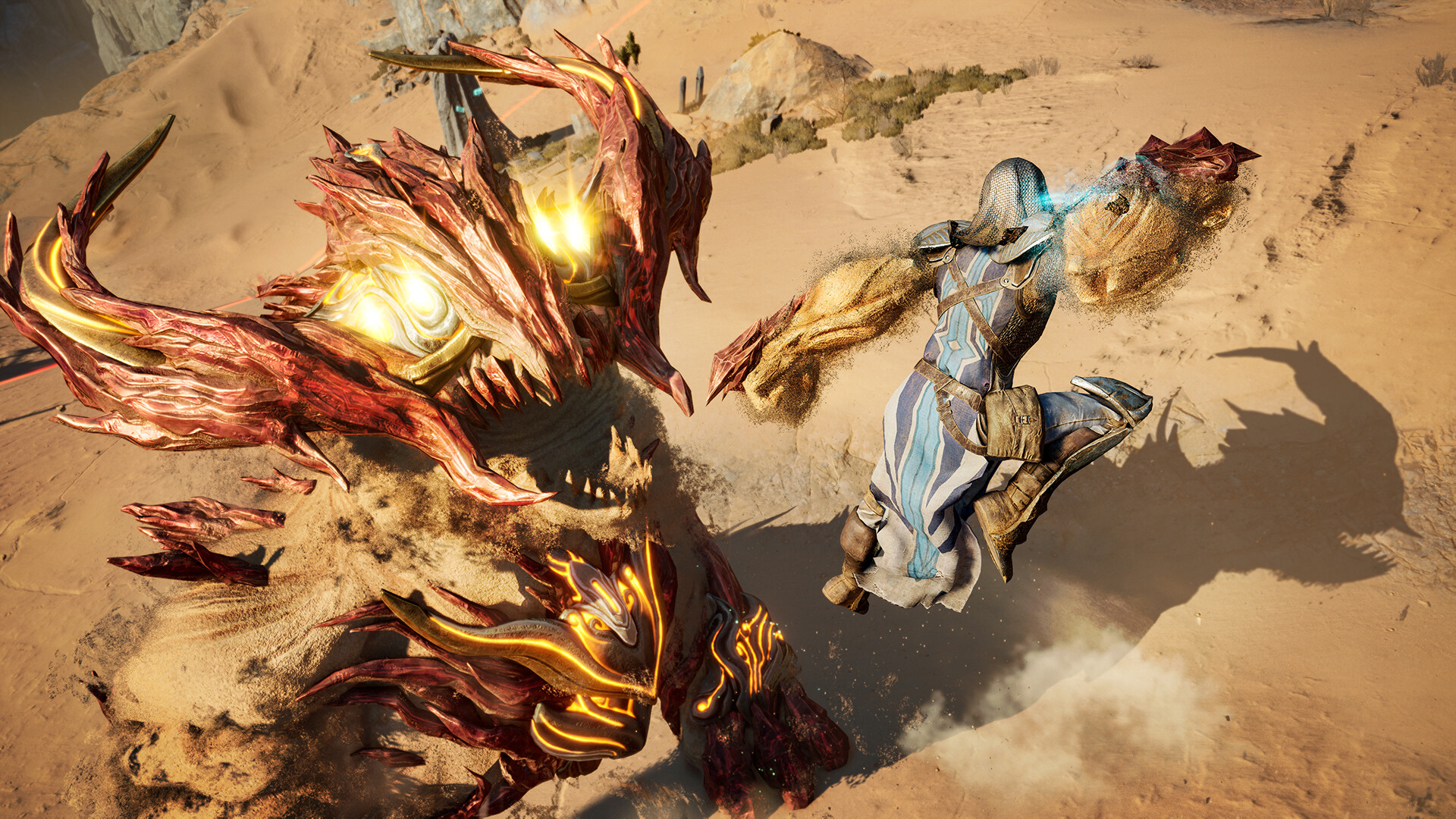GamesRadar+ Verdict
If you were asked to imagine a truly average open-world action-adventure in 2023, you'd likely come up with something like Atlas Fallen. If very little here is actually dreadful, not much more is original, or imaginative, or genuinely entertaining either, nor is it even especially polished. You've likely seen it all before, in other words. And if you haven't, there are better places to start.
Pros
- +
Character movement is bold and slick
- +
The momentum system is an interesting addition to combat
Cons
- -
Bland fantasy setting
- -
Unreliable camera, lock-on, and parry systems
- -
Quests are repetitive and unimaginative
- -
Doesn't make the most of its sand slide mechanic
Why you can trust GamesRadar+
The signature move in Deck 13's action adventure is the sand slide. Endowed with the power of a mysterious otherworldly being, your avatar can skate along reams of desert as if riding an invisible snowboard, cresting dunes and banking into turns apparently by making the sand particles move beneath their feet. As a form of cruising around an open world, it has instant appeal. You slide for the fun of it, just because it's smooth and flashy. At least that is until you start to wonder: why doesn't Atlas Fallen make more of this?
Release date: August 10, 2023
Platform(s): PC, PS5, Xbox Series X
Developer: Deck13
Publisher: Focus Entertainment
After an on-rails introduction to your skiddy new skill, you may expect a string of exhilarating chase sequences scattered throughout, or slopes that let you gather speed to launch yourself across the land. But other than looking stylish, sand sliding is really only another way of running – functionally identical to the sprint action your character performs when they aren't on a dirt surface. It's both disappointing and indicative of a game that, once you scrape away the topsoil, has little of note to offer.
Standing tall
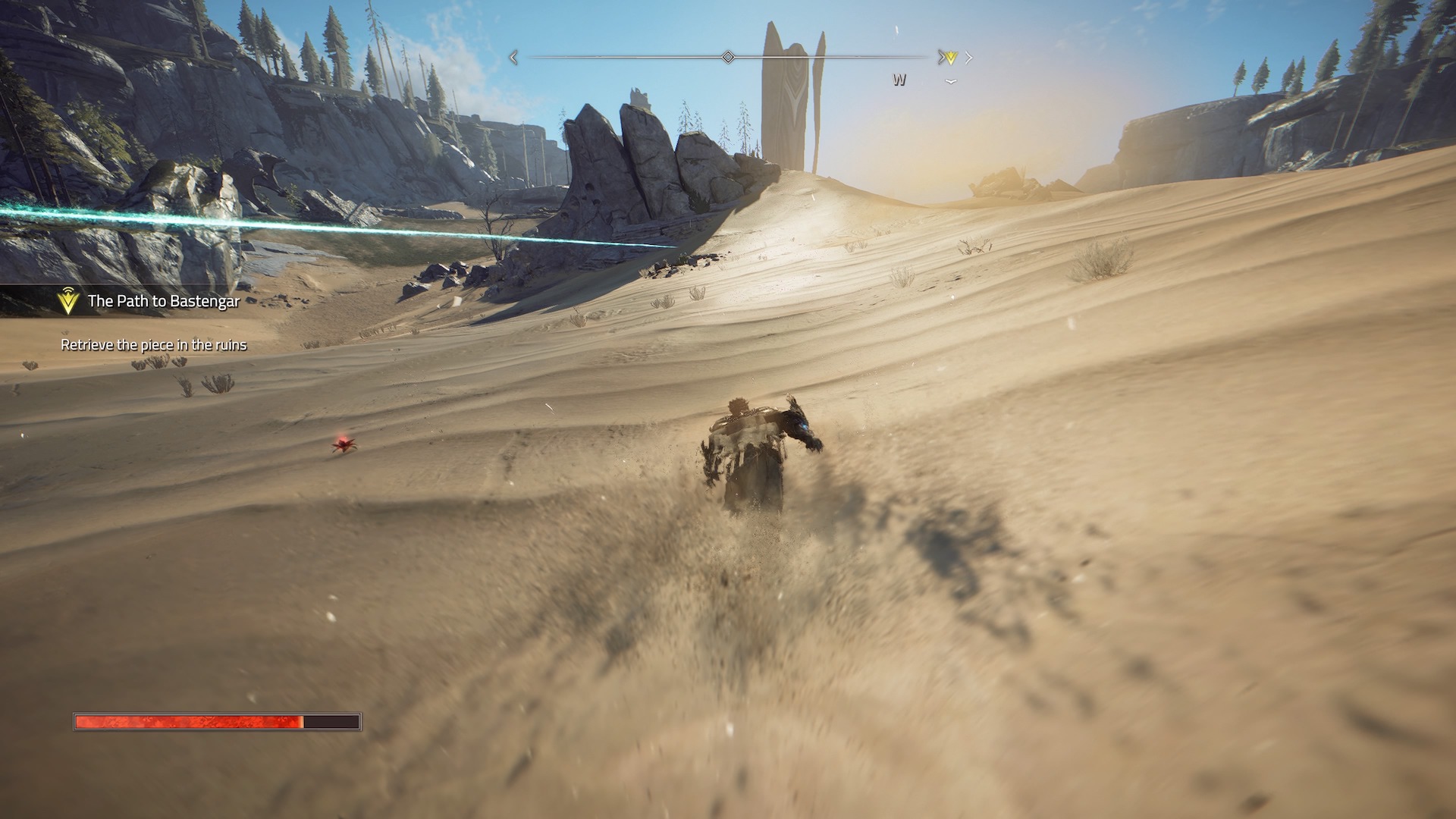
The movement of your customisable character, whether sliding or not, is one of few standout features. Once Atlas Fallen's plot acquaints you with a magic gauntlet that houses the spirit of the enigmatic and powerful Nyaal, you'll be sliding, double jumping, rolling, and air dashing with agile ease. You'll also be fighting with an axe and a whip conjured from sand (a combination unabashedly inspired by God of War), yanking yourself towards hostile monsters, known as wraiths, before delivering crispy combos. You may even detect hints of Bayonetta's showy poise in your actions.
Don't get too excited by the A-list name dropping, though, as Atlas Fallen struggles to convert these skills into interesting things to do. As an open-world game (although technically it's split into a handful of separate areas that you access one at a time), it's remarkably unambitious in structure. NPCs no sooner say 'Hello' than ask for favors, which see colourful markers plopped on the map. Slide on over and more than likely you'll need to dispatch a sizable wraith before heading back for a reward. Sometimes a marker is surrounded by a big circle, which of course means you have to search within its circumference for some hidden thing or other. It's all about as fun and varied as it sounds.
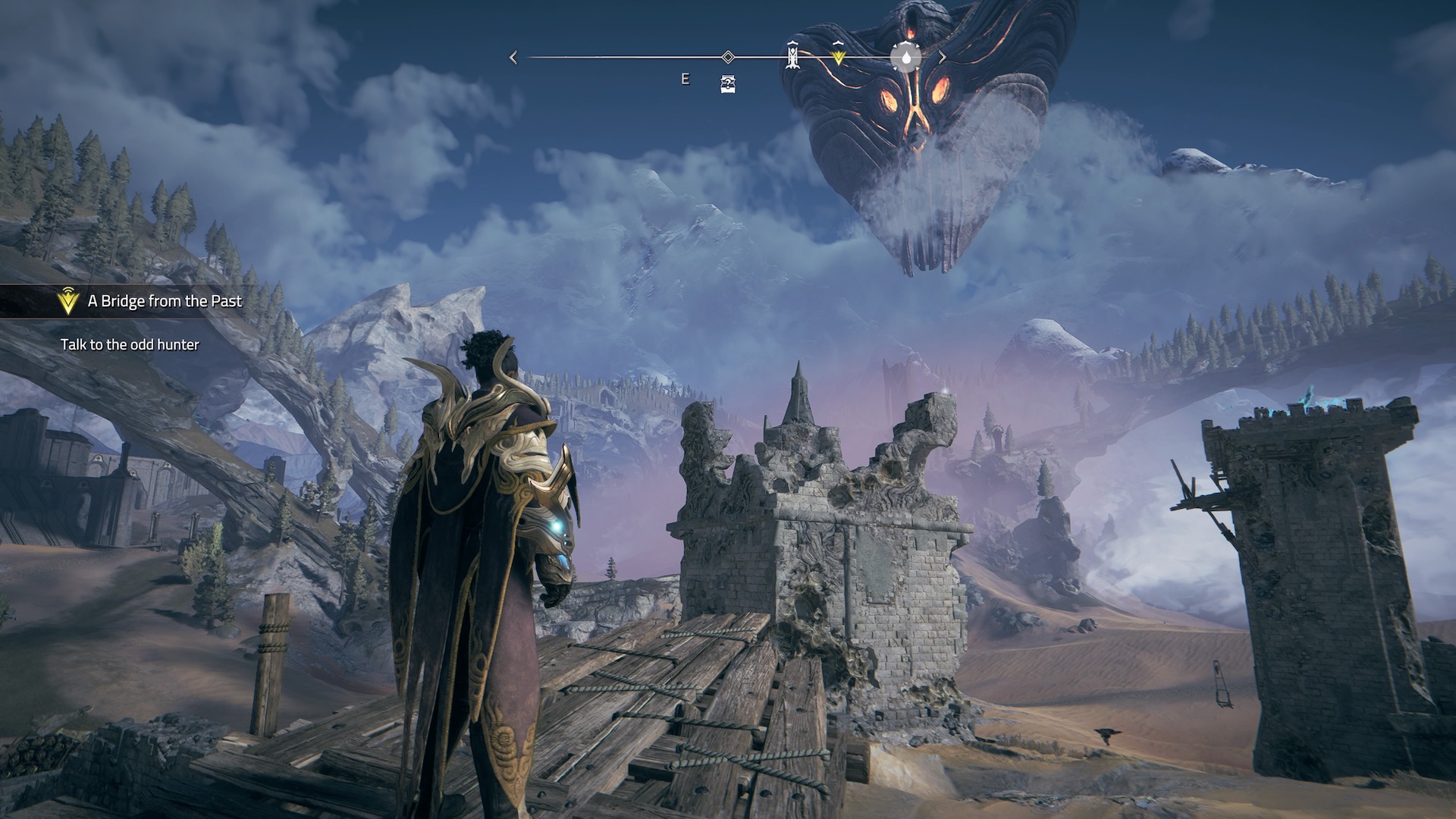
The other key trick the gauntlet places up your sleeve is called 'Raise', which means you can pull great chunks of stone up from the ground. Well, specific chunks of stone marked with a blue glow that invariably serve to bridge a gap, making its use heavily prescribed. Still, it does help to reveal paths for exploration, and there's pleasing verticality in the landscapes when you do, providing some mild platforming challenges. Then again, most of the treasure chests you find at the end of the rainbow either contain a bit of cash or if you're lucky precious artefacts that, oh yes, you can sell for a bit of cash.
As in many routine open-world games, then, you go about tidying up the map by charging from one errand to the next like a courier without a bike. Even that's not always straightforward, though, since the map of this three-dimensional world is so obstinately two-dimensional – reach your marker and you may suddenly realise you need to be much higher or lower, which requires a very different route. Given how much Atlas Fallen is about navigating the contours of its environments, it's also dismaying to be partnered with a camera that can't pan up to a steep angle, that your smooth moves glitch on slopes, and that there's aggressive pop-in when you're racing about.
Combating frustration
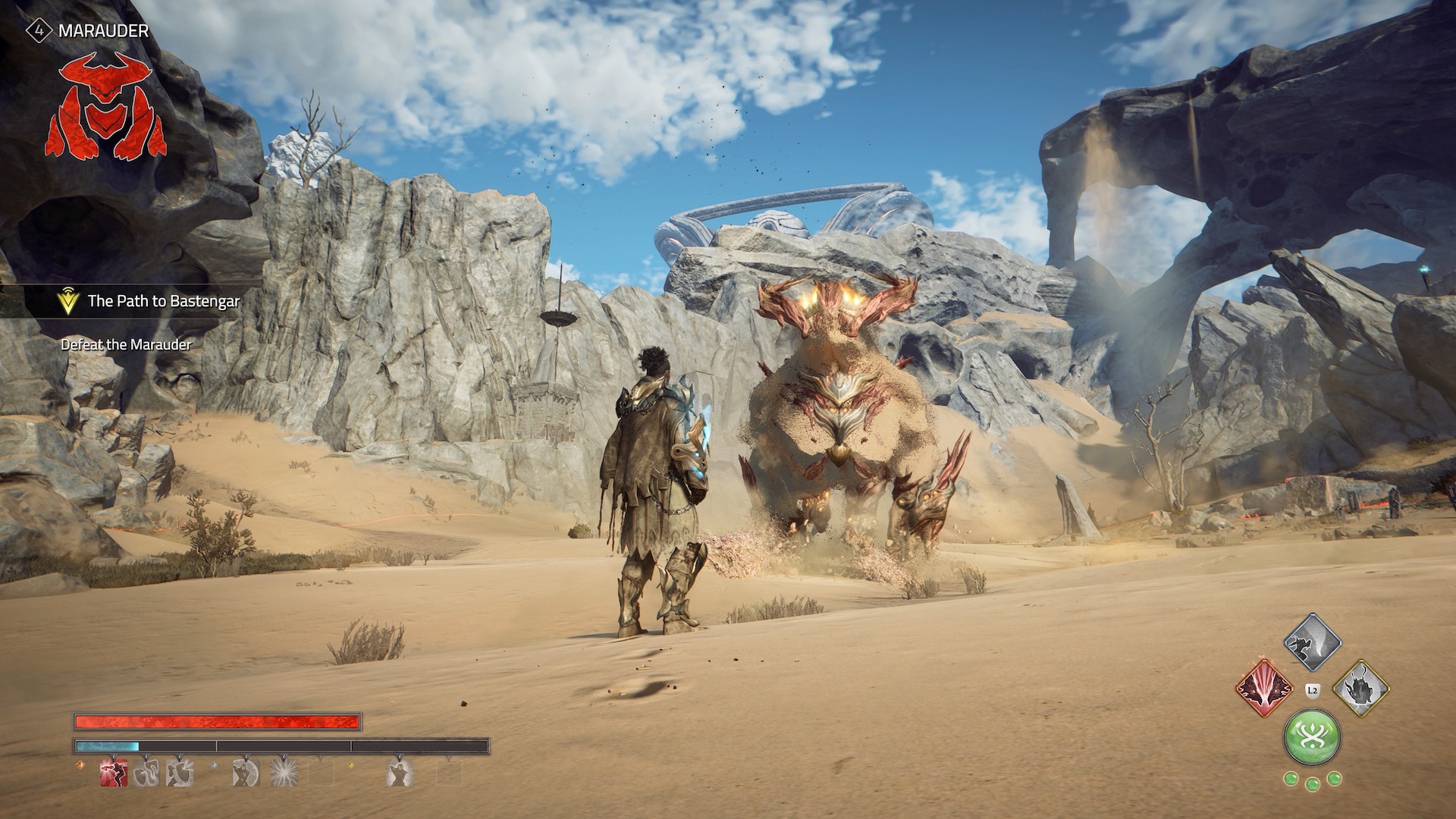
Indeed, a very ordinary execution of very ordinary ideas pervades Atlas Fallen, not least its combat. Despite initial promise, it's a slippery pig to get to grips with, as if its systems want to evade your grasp. The camera and lock-on are chief culprits, both requiring constant micro-management to maintain any coherence. Whatever you train your sights on, you can bet it'll bolt off across the arena, leaving you gawping from afar as its mates hammer you from behind. The presence of little warning arrows for offscreen attacks is some relief, but it's difficult to focus on those and signals coming from visible enemies at the same time. Nor does it help much when a large wraith smothers the entire view.
The other problem is a parry system that's as baffling as it is essential. After 20 hours I'm still barely any the wiser how to time it correctly. Reacting to red sparks that signify an incoming attack works sometimes but not others, and even though you'll get used to facing the same kinds of wraiths over and over (there are only some 16 in all), you may remain as likely to get trashed by a familiar combo as ace it. When compared to a recent peer such as Wo Long: Fallen Dynasty, this is, well, hard to defend.
Scrapping in Atlas Fallen isn't entirely without its pleasures, though, when you can make it work. Airborne combat can be maintained for satisfyingly long chunks of battles, using the whip and air dash to track hovering enemies. The ability to target and break individual body parts on big wraiths can make taking them down a worthy proposition too. There's also decent potential for customisation – not so much with weapons (only a pair of hard- and fast-hitting fists joins the original pair) – but in a wide range of special moves you can earn then choose between. To the extent the combat did eventually click for me, it was because I was able to use these abilities to avoid or mitigate the damage when the camera or parry system fought against me.
The way these abilities are implemented, in fact, is the one fresh idea in Atlas Fallen, and it deserves to reside in a better game. During fights, you gather 'momentum', which increases the damage you dish out and receive. But also, the longer it grows, the more of your equipped perks and attacks are activated, with the most powerful of all coming into play when the momentum bar is near full. At any time, however, you can empty all momentum into a 'shatter' attack that damages everything nearby. Deciding when to unleash this barrage and when to keep accumulating is a neat little risk-reward mechanism.
Empty promises
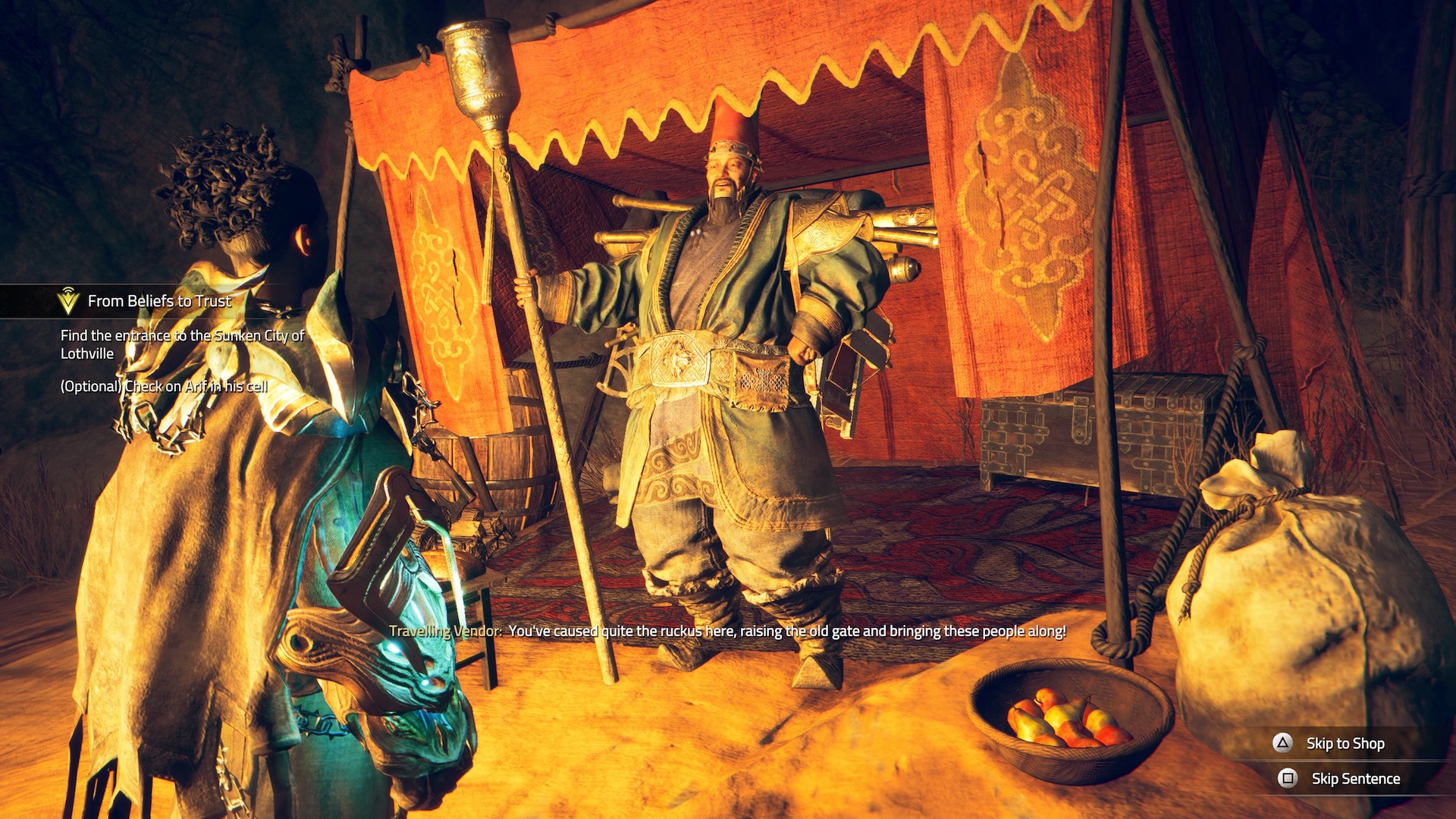
If Atlas Fallen does build some momentum of its own here, though, it's never long before it slips back into suffocating ordinariness, and nothing highlights the point more strongly than its surrounding fiction. Setting, lore, plot, characters, you name it – they're all cliched, hackneyed, and lifeless. The main thrust of the story about an evil god that watches over the desolate land produces scenarios that would slot into any shrugged up fantasy confection. Vapid discussions with NPCs, meanwhile, see them shift their opinions the moment you suggest an alternative. The script is also robotically dull, matched only by the flat voice performances.
What grates most here is the absence of any tangible commitment or substance. At one stage, you rescue a group of people from their decaying home and bring them to a new settlement. Soon you overhear the refugees complaining about not being welcome, and locals saying things like, "I do hope they'll contribute to our little society." It's an attempt to dip a toe into modern debates on immigration, but it doesn't push on to anything more thought provoking beyond such throwaway observations.
This is Atlas Fallen in a nutshell, though. It isn't a disaster. It's proficient in some respects, adequate in others, and manageable at worst. But that leaves a creative void in its world and the way you interact with it that calls into question the value of the whole endeavour. If you're hankering for yet another open-world action adventure, particularly for its co-op play, maybe you'll extract some joy from this sandbox. Otherwise, let it slide on by.
Atlas Fallen was reviewed on PS5, with code provided by the publisher.
More info
| Genre | Action |
Jon Bailes is a freelance games critic, author and social theorist. After completing a PhD in European Studies, he first wrote about games in his book Ideology and the Virtual City, and has since gone on to write features, reviews, and analysis for Edge, Washington Post, Wired, The Guardian, and many other publications. His gaming tastes were forged by old arcade games such as R-Type and classic JRPGs like Phantasy Star. These days he’s especially interested in games that tell stories in interesting ways, from Dark Souls to Celeste, or anything that offers something a little different.
